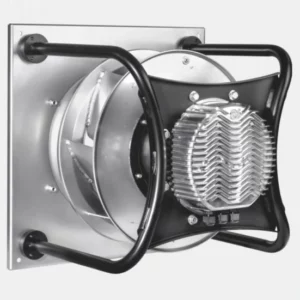Variable speed drives (VSDs), also known as variable frequency drives (VFDs), can significantly affect the performance of radial centrifugal fans in various ways.
Here are some key aspects to consider:
- Energy Efficiency: VSDs allow for precise control of the fan speed, enabling the fan to operate at optimal speeds based on the specific requirements of the system. By adjusting the speed of the fan motor to match the actual demand for airflow, VSDs can reduce energy consumption and improve overall energy efficiency. This is particularly beneficial in applications where airflow requirements vary over time.
- Flexible Operation: With VSDs, radial centrifugal fans can operate over a wide range of speeds, offering greater flexibility and versatility in meeting varying process or system requirements. This flexibility allows for better matching of the fan output to the changing demands of the application, resulting in improved system performance and responsiveness.
- Improved Control: VSDs provide precise control over the fan speed, allowing for gradual ramping up or down of the motor speed as needed. This finer level of control enhances system stability, reduces the risk of overpressurization or underpressurization, and minimizes fluctuations in airflow and system performance.
- Reduced Mechanical Stress: Operating the radial centrifugal fan at lower speeds using VSDs can help reduce mechanical stress and wear on the fan components, including the motor, bearings, impeller, and drive system. radial centrifugal fan By avoiding unnecessary high-speed operation, VSDs can extend the lifespan of the fan and reduce maintenance requirements.
- Noise Reduction: Running the fan at lower speeds using VSDs can result in reduced noise levels compared to operating at full speed. This is particularly advantageous in applications where noise control is important, such as HVAC systems in residential or commercial buildings.
- Soft Start and Stop: VSDs allow for soft start and stop functions, gradually ramping up or down the fan speed to minimize sudden changes in airflow and system pressure. This feature helps prevent system shocks, reduces wear on mechanical components, and improves system reliability.
- Optimized Process Control: In industrial applications, VSDs enable precise control over airflow rates, pressure levels, and other process parameters, leading to improved process control and efficiency. By adjusting the fan speed in real-time to match the process requirements, VSDs can help optimize production processes and enhance product quality.
- Dynamic Response: VSDs offer rapid response capabilities, allowing the fan speed to be adjusted quickly in response to changes in system demand or operating conditions. This dynamic response capability ensures that the radial centrifugal fan can effectively adapt to fluctuations in airflow requirements, maintaining system performance and stability.
Overall, variable speed drives can have a significant impact on the performance, energy efficiency, and control capabilities of radial centrifugal fans, making them valuable components in a wide range of industrial, commercial, and HVAC applications.
